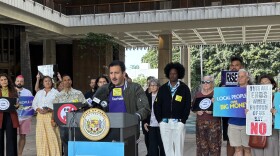The Environmental Legislative Caucus introduced 10 new bills on Friday that focus on issues such as cesspools and carbon emissions.
State Rep. Nicole Lowen is co-chair of the caucus and head of the House Energy & Environmental Protection Committee. Her bills focus on reducing emissions by 70% by 2030 – compared to 2005 levels – and mandating energy efficiency measures at all major state facilities.
Her third bill addresses the 80,000 cesspools in the state that have a statutory mandate to be converted by 2050.
"The bill we’re introducing this year sort of starts a process of attrition by requiring cesspool conversion at the point of sale of a property," explained Lowen. "And this bill also includes a fully refundable tax credit of either $15,000, $10,000, or $7,500 depending on the income level of the filer that would help to offset the cost of conversion."
Sen. Mike Gabbard is also co-chair of the caucus and introduced three bills. He proposes to raise visitor green fees and set up a carbon incentive program for regenerative agriculture and sustainable forest practices.
He also authored a bill to add a green amendment to the state’s constitution.
"Green amendments are provisions that are added to the Bill of Rights section of the state constitution that recognize and protect the rights of all people regardless of race, ethnicity, religion, or income, including future generations, to pure water, clean air, a stable climate, and healthy environment," said Gabbard.
The caucus also introduced four bills on decommissioning the Red Hill fuel storage facility, adding a carbon tax, improving soil health, and protecting native birds and bats from wind turbines.






